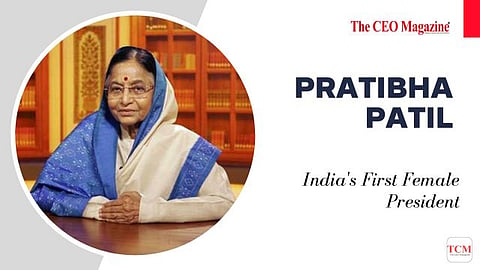
- News
- Women
- Magazine
- IndustryIndustry
- InsightsInsights
- Success Stories
- PublishPublish
- ContactContact
- Media KitMedia Kit

Pratibha Patil
India's First Female President
Pratibha Devisingh Patil, born on December 19, 1934, in the village of Nadgaon in Jalgaon, Maharashtra, India, is a name etched in history as the first woman to hold the prestigious position of President of India. Her life journey, from her humble beginnings in a Marathi family to reaching the highest office in the country, is nothing short of remarkable.
Pratibha Patil's educational journey began with R. R. Vidyalaya in her hometown, followed by an impressive academic pursuit. She earned a master's degree in Political Science and Economics from Mooljee Jetha College, Jalgaon, which was then under Poona University.
Subsequently, she pursued a Bachelor of Law degree at Government Law College, Bombay, affiliated with the University of Bombay (now the University of Mumbai).
Her foray into the legal profession began at the Jalgaon District Court, where she embarked on her legal career. Simultaneously, she showed a deep interest in addressing social issues, particularly those concerning the well-being and empowerment of Indian women.
In 1965, Pratibha Patil married Devisingh Ramsingh Shekhawat, and the couple has two children, a daughter named Jyoti Rathore and a son, Raosaheb Shekhawat, who, like his mother, ventured into the realm of politics.
At the age of 27, in 1962, Pratibha Patil was elected to the Maharashtra Legislative Assembly, representing the Jalgaon constituency. Her political career soared from there, as she secured four consecutive victories in the Muktainagar (formerly Edlabad) constituency between 1967 and 1985.
Her journey continued in the Rajya Sabha from 1985 to 1990, and she became a Member of Parliament, representing the Amravati constituency, during the 1991 elections for the 10th Lok Sabha.
Her role extended to various Cabinet portfolios during her tenure in the Maharashtra Legislative Assembly, and she held key positions in both the Rajya Sabha and Lok Sabha.
Furthermore, she served as the President of the Maharashtra Pradesh Congress Committee for a few years and was involved in significant roles such as Director of the National Federation of Urban Co-operative Banks and Credit Societies and a Member of the Governing Council of the National Co-operative Union of India.
On November 8, 2004, Pratibha Patil made history by becoming the first woman to hold the position of Governor of Rajasthan.
Pratibha Patil's journey to the highest constitutional office in India commenced when she was announced as the United Progressive Alliance (UPA) candidate on June 14, 2007. Her selection as a presidential candidate came after political negotiations and debates over the nominee, as the left-wing parties of the UPA coalition initially opposed other candidates.
Patil's long-standing loyalty to the Indian National Congress (INC) and the Nehru–Gandhi family played a pivotal role in her selection by INC leader Sonia Gandhi. Despite this loyalty, she asserted that she had no intention of being a "rubber-stamp president."
Her tenure as President of India, from July 25, 2007, to July 25, 2012, was marked by various controversies. Critics claimed it was lacklustre due to her lack of charisma and her belief in the supernatural. During her presidency, Patil commuted the death sentences of 35 petitioners to life, a record number.
In terms of foreign travel, Patil set a precedent by taking more foreign trips, often accompanied by family members, than any of her predecessors. She faced criticism for the high expenditure associated with these trips.
Following her retirement from the presidency, Patil was embroiled in several controversies. She reportedly used public funds to construct a retirement mansion on military land in Pune, which was unprecedented for a retiring president.
Other controversies included her desire to claim both an official government car and fuel allowance for a private car and her retention of gifts given to her in her official capacity.
Apart from her political career, Pratibha Patil made significant contributions to the field of education and cooperative businesses. She founded educational institutions like Vidya Bharati Shikshan Prasarak Mandal and Shram Sadhana Trust, which focuses on improving the lives of working women.
Additionally, she established a cooperative sugar factory known as Sant Muktabai Sahakari Sakhar Karkhana.
However, there were also controversies surrounding her business interests, particularly the failure of Pratibha Mahila Sahakari Bank, a cooperative bank that she co-founded. The bank ceased trading in 2003 after its license was cancelled by the Reserve Bank of India, primarily due to illegal loans provided to her relatives.
Pratibha Patil's legacy is twofold. As the first female President of India, she broke gender barriers and contributed to the nation's political history. Simultaneously, her presidency was marked by various controversies and challenges.
In recognition of her significant contributions to Indian society and her historic presidency, Pratibha Patil was honoured with the Order of the Aztec Eagle, the highest civilian honour of Mexico, in 2018.
Pratibha Patil's journey remains a subject of both admiration and scrutiny, a testament to the complexities of a political career in a diverse and dynamic nation like India.
Follow us on Google News
